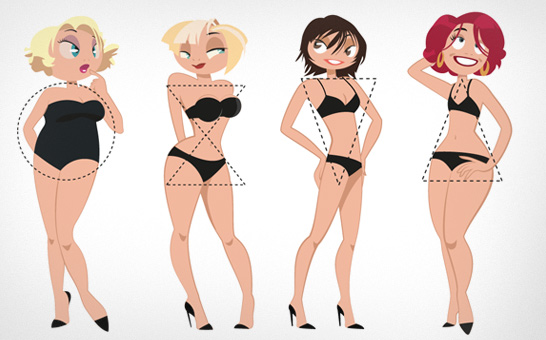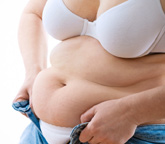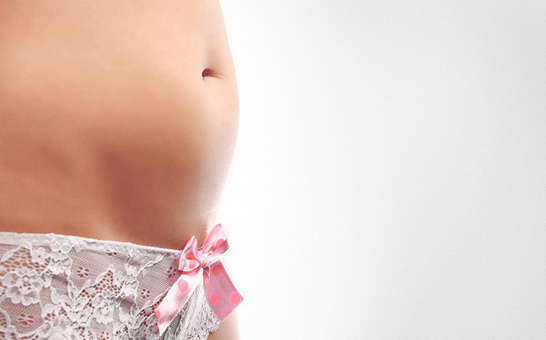Girl, why do you need such a big belly?
A big belly is a clear sign of poor nutrition and physical inactivity, especially in men who drink beer. However, obesity at the waist is not such a problem. It is worse when the stomach suddenly increases, indicating the occurrence of some disease. Let's try to figure out what the reasons for this might be.
GUTS BLOW MARCHES
In men and women, the stomach can grow due to problems with stool and flatulence. Both constipation and diarrhea lead to the accumulation of gases that press on the walls of the abdomen. It begins to noticeably enlarge and becomes painful and hard. Well, the main cause of flatulence is such an intestinal pathology as dysbiosis. This is when the balance between beneficial and pathogenic microbes in the stomach shifts in favor of the latter. As a result, the processing of food products is disrupted, the processes of their rotting in the stomach increase, and gas formation increases sharply.
The cause of abdominal growth may be intestinal atony. A passion for eggs, dairy products and meat foods, especially fried ones, leads to the fact that these products accumulate in the intestines without having time to be digested. As for women, fashionable protein diets can also provoke atony.
LACTASE DEFICIENCY
In the body of men and women with age, there may be a deficiency of this enzyme, which breaks down milk sugar contained in milk. As a result, all dairy products, without being broken down by lactase, form violent gases in the colon. There is bloating, nausea and pain in the peritoneum.
DIGESTION HAS NOTHING TO DO HERE
The belly can grow due to changes in the intestines, i.e. tumor that caused her obstruction. If the stomach swells unevenly in the upper part, and even on the right, then the gallbladder and liver should be checked. If on the left, then this may indicate the growth of the spleen. Its volume increases in such serious diseases as leukemia, lymphoma and mononucleosis.
In women, the lower abdomen can grow due to gynecological problems. Neoplasms in the uterus and ovaries can reach 2-3 tens of centimeters and weigh several kilograms. An ultrasound is required to make a diagnosis.
The accumulation of fluid in the abdominal cavity (ascites) also causes rapid growth of the abdomen. He looks like he's puffed up balloon. To drain fluid, a puncture is made in the abdominal cavity. Ascites is caused by a whole bunch of different diseases. Therefore, before performing surgery, it is necessary to cure the existing disease.
WHAT CAN THE STOMACH GROW IN HEALTHY PEOPLE
If we exclude normal overeating, then the reasons for this may be:
The habit of eating quickly, as a result of which large portions of air are swallowed into the esophagus.
Abuse of carbonated drinks.
Eating large quantities of food that causes gas formation and fermentation in the abdominal cavity. These are, first of all, cabbage, black bread, garlic, legumes, melon and grapes.
In any case, the excess air accumulated in the stomach will be belched out quite quickly or absorbed into the intestinal walls.
A big belly is a general definition of disharmony in the structure of the body, in which the size of the belly goes beyond natural proportions. It can be larger than the butt, stick out beyond the bust line and completely eliminate the waist.
People call this phenomenon impartially “mirror disease,” because you can only see your legs in the mirror.
Typically, this phenomenon is explained by excess fat. Adipose tissue abounds on the waist, sides, back, and rolls down the abdomen. The situation is further complicated by the fact that a significant amount of fat is also deposited inside the intestines, liver, and kidneys. It is called visceral fat.
Natural causes of belly fat in women

The first thing that comes to mind is pregnancy. An unexpected surprise befalls both young girls and women over fifty who have long given up on their menopause. Therefore, if you suddenly lose weight, a pregnancy test is the first thing to do.
The second natural cause of disproportion is the structural features of the body. Women's body types are very different. There are more than 10 types. In apple and lollipop types, fat is primarily stored in the lower abdomen, and not on the hips and buttocks, as in the “hourglass”, for example.
While the “apple” girl is thin, her tummy is within statistical limits and looks pretty. But as soon as she starts to get better, disaster strikes. The belly gets better more than other parts of the body.
What to do?
With body types with an emphasis on the stomach, you will have to control your weight throughout your life. Sweet baked goods, chocolate, sweets, creams - maximum once or twice a week. Fatty meat - no. Bread is only black, grain and to a minimum. Abdominal strengthening exercises – constantly. It is advisable to visually enlarge your lower body. To do this, use exercises for the legs and buttocks.
How poor posture affects belly size

Sometimes the cause of disproportion lies in incorrect posture. A curved spine displaces everything internal organs from their places, and they rush out. Overweight however, it may not exist or it may be insignificant.
Teenagers especially suffer from this problem. Studying at a desk, when you have to sit for a long time and a heavy, heavy briefcase lead schoolchildren to scoliosis. If you don't take action, this the situation continues into adulthood.
And then the young girl or woman suffers with a disproportionately large belly and tries different diets to no avail. In this case, any abdominal exercises are useless.
What to do?
You need to work on your posture and strengthen your back muscles. In such cases, the first recommendation of orthopedists is go to the pool. Swimming is very good at correcting minor deviations in the spine. Water relieves some of the stress and brings the vertebrae to their correct natural position. In this case, the effect is consolidated and fixed with the help of muscles pumped up during swimming.
Fitness will also be useful. You just need to focus not only on the abs, but also on the back. Strong, properly formed muscles create a muscular corset, which holds the spine in the desired position. Then the internal organs, and after them the stomach, will take their natural places.
Hormonal imbalances and waist size

Hormonal imbalances contribute to obesity. Thyroid hormones are responsible for the breakdown of fatty acids. Their deficiency or excess leads to metabolic disorders. Fats are not broken down and settle on the stomach, thighs and other parts of the body.
What to do?
Check your thyroid gland, maybe do a hormone test. Optimize your diet. Saturate it with iodine.
The effect of stress on a woman’s body and excess weight

The stress hormone cortisol also affects fatness. The more cortisol produced in the body, the fatter a person will be. On the one hand, the hormone affects the absorption of fats, on the other hand, it affects appetite.
Various troubles force us to eat away our anxiety with a lot of delicious food. Unfortunately, these are rarely apples and cabbage. More often chocolate, baked goods or high-calorie salty foods.
What to do?
- Drink more. Water reduces the concentration of stress hormones in the blood.
- Take a walk. Walking in clean air increases the amount of pleasure hormones in the body.
- Dance, get yourself another favorite hobby.
- Learn breathing techniques for relaxation and meditation.
- The gym and physical activity also help expend excess adrenaline.
Why does a woman's body begin to metabolize fat in a male manner?

Female stress is characterized by suppression of ovarian function. They stop producing in sufficient quantities estrogen and progesterone. Instead, adrenaline production increases. The body begins to metabolize male fat and store it on the abdomen.
Therefore, you can often determine by a woman’s figure how happy she is in personal life. A calm woman who feels safe does not have hormonal problems. She doesn't need adrenaline to protect herself.
What to do?
In case of scandals with a partner, it is possible to reduce the amount of stress, but you will have to act radically. Options: family psychotherapy and leaving the relationship.
As women age, their hormonal levels change. The functions of the ovaries are suppressed. We may start to gain weight. The older a person is, the less caloric his diet should be.
How to get rid of belly fat by adjusting your diet

The most common nutrition mistakes:
- Large portions that stretch the stomach.
- “Uneven” nutrition, when almost the entire daily requirement is eaten at one time.
- High-calorie snacks: buns, sandwiches, hot dogs...
- Fast food.
- The diet contains few vegetables and fruits.
- Skipping breakfast.
- Lots of fatty and floury foods.
- The diet is made up of refined and processed foods that are low in nutrients.
- Large amounts of sugar and sugar-containing products.
- Little fiber.
- Dishes cooked in large amounts of fat, fried and stewed.
What to do?
- A proper diet contains about 60% vegetables and fruits. It can be fresh salads from greens and vegetables, salads such as vinaigrette, stewed vegetables and stews, fruit salads.
- Be sure to have a sufficient amount of proteins: meat of any kind, fish, eggs, dairy products, legumes.
- Varied food. Don't get hung up on any one product or dish. Then today you can easily eat pizza or barbecue, then cabbage and fish or chicken with porridge. There will be no harm to your waistline if you alternate high-fat foods with low-calorie foods.
- Small meals: often, but little by little. This will help keep your stomach at normal size.
- Proper snacks: fruits, nuts, dried fruits, cereal bars, crispbread. Always carry it with you so you don’t have to look for a pie or chocolate in a hurry.
- Steam, boil or bake more. Eat fried food from time to time. Stew properly without a lot of fat. Smoked meats are a delicacy for the holidays.
- Allow yourself unhealthy treats in the first half of the day.
- Use tricks to burn fat: spices, kefir, green tea.
- It is advisable not to eat after 6 pm. Insulin, which is released at this time of day, sends everything to reserve. You can: milk, kefir, apple.
- Love soups.
- Never, ever deprive yourself of your favorite treats. Just eat them in moderation and not too often. Better yet, alternate: this week you will have chocolate, next week you will have cake, then your favorite puff pastry. Otherwise, sooner or later you will fall apart.
- Try to eat healthy carbohydrates and definitely bran bread. Carbohydrates should never be completely eliminated. This is our energy.
- Lightly salted food is preferable to highly salted food. Excess salt retains water and feeds fat cells. If possible, replace regular sea salt.
The less movement, the larger the belly

Physical inactivity is extremely unnatural for the human body. Our body is not designed to sit in an office chair for many hours. This is a huge negative burden on the body.
We don't use up the calories we eat during the day.. The muscles gradually atrophy, and the stomach grows. All our food, including healthy proteins and carbohydrates, goes exclusively into fat. Because there is nowhere to spend energy.
Over time, obesity and a large belly are accompanied by vascular dystonia. How else? Congestion in blood vessels during sedentary work is inevitable. And then the desire to move disappears.
It turns out a vicious circle: we sit, we gain weight, our blood vessels become contaminated with cholesterol, this makes us want to lie down more, avoid any stress, and we gain weight again.
What to do?
Office work is not a death sentence. Although this is a serious test. Give yourself some exercise every hour. There are a lot of exercises that allow you to stretch your body well. a short time. These are squats, planks, lunges, bends. This will give your muscles a workout and improve blood circulation.
Walk more. 4-5 km. per day should become the norm. Yes, you will spend an hour of time, but you will burn more than 1000 calories and stretch your entire body. Get more active outdoors. Weekends are not for lying on the couch.
Why does the belly begin to grow after childbirth?

The postpartum period is dangerous for the stomach for two reasons:
- During pregnancy, the walls of the abdomen stretch and in most cases it is difficult to return to their original place. If the diet is unbalanced, the abdominal cavity quickly becomes overgrown with fat. At the same time, it is not very important how much a young mother eats - her metabolism is still tuned to maximum absorption of nutrients.
- Lack of sleep leads to overeating - this scientific fact. The body compensates for the stress of lack of sleep with enhanced nutrition.
What to do?
- Special exercises for retracting the abdomen will help, but fitness trainers recommend using them only 6 months after the birth of the child. Unfortunately, by this time you can already acquire a solid tummy.
- If the mother does not breastfeed, it is not difficult to create the right diet. But a nursing woman is quite limited in her choice of products.
- Sleep all your free time. Yes, it's difficult, but no one benefits from an unhappy and tired mom.
- Devote your free time from sleep to walks and physical activity.
She’s thin herself, her belly is big: why?

Sometimes women complain that with a slender body they have a large protruding belly. About fat deposits in in this case there is no question. Abdominal exercises do not give results.
There may be several reasons:
- Flatulence. Usually occurs with dysbacteriosis. Introduce foods with live bacteria into your diet and the problem will disappear.
- Intestines clogged with waste. The digestion process is slow, food accumulates in the intestines and the stomach becomes large. It is necessary to cleanse the intestines. To do this, use fiber, pumpkin dishes, and stewed cabbage.
- Congenital intestinal anomaly (elongated intestine). You can only correct it with clothes.
Watch your diet, exercise, move more, and be sure to get examined to identify health problems that can cause a big belly.
This is not pregnancy, there is no critical weight gain, but the jeans can barely fasten at the waist. What is happening, women ask themselves, seeing no particular reason for this state of affairs. Why do women’s bellies grow and often neither diet nor grueling workouts help reduce waist size and remove this hated “tummy”? In fact, there is no clear answer to this question; in each individual case, different reasons are involved, but there are a number of factors that are worth paying attention to in the fight for harmony.
Excess fat deposits in the abdominal area consist, as a rule, of internal (visceral) fat; our internal organs are clothed in this fat and it is because of it that the abdomen takes on an enlarged shape. Excessive deposits of internal fat threaten the appearance of heart disease, the development of type 2 diabetes and the occurrence of oncology. If standard methods of combating excess weight, such as diet and exercise, do not bring results, the essence of the problem lies in physiology, more precisely in hormonal levels, age-related changes, genetics or the presence of certain diseases of internal organs.
Why the belly grows in women: age-related changes
With age, the rhythm of fat accumulation and breakdown in our body changes. Metabolic rate decreases, this happens in both men and women. In women, this is also accompanied by problems that arise during menopause. Women should first of all look for the answer to the question of why the belly grows after fifty in the office of an endocrinologist and gynecologist. During menopause, the level of production of the hormones estrogen and progesterone decreases significantly, and testosterone levels also decrease, although at a less accelerated pace. These hormonal changes cause weight gain in the abdominal area. And that's bad news. The good news is that you can fight this.
Irritable bowel syndrome
Intestinal dysfunction can also lead to an enlarged belly. This condition is accompanied by constant bloating, which is often accompanied by pain, constipation or bouts of diarrhea. Intestinal dysfunction does not mean any pathology of the intestinal tract, it only means that the digestive system is not working properly. In principle, intestinal tissues are hypersensitive, so there is nothing extraordinary in the appearance of such symptoms.
Bloating is one of the most unpleasant side effects irritable bowel syndrome. It is bloating that many women mistake for weight gain, since the usual clothing size in this condition turns out to be too small. It is noteworthy that in the evening the symptoms of bloating intensify and this often results in stress for those who have a period social activity falls exactly at this time of day.
To prevent bloating, it is recommended to reduce the consumption of cereal fiber. Eliminate oatmeal, muesli, and cereal bars. White bread, butter bars and cookies can generally be left out. Probiotics also help reduce symptoms, drink yogurts like Activia, or, after consulting with your doctor, take a course of acidophilus medications. In some cases, antispastic drugs, laxatives, or drugs with the opposite effect are prescribed.
Flatulence
If you notice frequent accumulation and release of gas, but there are no other alarming symptoms, flatulence may be the cause of abdominal growth. In general, there is nothing wrong with emitting gases; often a person does not even notice it, but often increased gas formation causes a feeling of discomfort and interferes with a full life. In such cases, it is recommended to limit the consumption of non-absorbable carbohydrates, in particular beans and pulses, as well as cabbage  , broccoli, apples and prunes
, broccoli, apples and prunes  . A well-known sugar substitute, sorbitol, can also cause increased gas formation. Try to eat slowly, chewing your food well. Poorly digested food increases the risk of gas formation. In some cases, flatulence can be a symptom of certain diseases; you should not try to make a diagnosis yourself; it is better to entrust this matter to a specialist.
. A well-known sugar substitute, sorbitol, can also cause increased gas formation. Try to eat slowly, chewing your food well. Poorly digested food increases the risk of gas formation. In some cases, flatulence can be a symptom of certain diseases; you should not try to make a diagnosis yourself; it is better to entrust this matter to a specialist.
Celiac disease or enteropathy
Symptoms of enteropathy may include fatigue, weight loss but a protruding belly, and abdominal pain. Celiac disease is a type of food allergy  , which is caused by insufficient breakdown of grain proteins, those found in wheat and other products, ranging from pasta, bread and baked goods to sauces and gravies.
, which is caused by insufficient breakdown of grain proteins, those found in wheat and other products, ranging from pasta, bread and baked goods to sauces and gravies.
Enteropathy refers to an autoimmune disease that causes damage to the small intestine, which in turn affects its ability to absorb nutrients from food. Typically, celiac disease is diagnosed in childhood, but in some cases the diagnosis is made already in adulthood. If the above symptoms are present, as well as frequent bloating and increased gas formation, it is recommended to take a blood test for enteropathy.
Why the belly grows in women: hormonal fluctuations
Changes in hormone levels are observed during the premenstrual period or during early stages pregnancy. At this time, intestinal motility slows down, more time is spent digesting food and this increases the likelihood of bloating and constipation. Light physical activity and walks in the fresh air help to speed up the digestive system, and to avoid constipation, it is recommended to drink more fluids, eat more fruits, vegetables and whole grain products.
Ovarian cancer
Frequent bloating, a constant feeling of a full stomach, as well as pain in the lower abdomen may indicate cancer of the reproductive system, in particular ovarian cancer. Often the symptoms of ovarian tumors do not cause concern, and this makes diagnosis much more difficult. Due to its mild symptoms, ovarian cancer is often diagnosed at stages that require serious treatment or surgery. If you notice that your belly is growing for no apparent reason, and you constantly feel bloating and heaviness in the lower abdomen, as well as pain when eating and urinating, consult a doctor immediately. The earlier a tumor is detected, the easier it is to get rid of it.
Wrong training program
Daily jogging and new-fangled fitness practices may be good for the heart muscle, but cardio training is not particularly helpful in reducing waist and abdominal size. The secret to effective training lies in a balanced combination of weight training and cardiovascular exercise. Strength training helps build muscle mass and therefore burn more fat. It is recommended to spend 250 minutes of moderate-intensity exercise and 125 minutes of vigorous-intensity exercise per week. Of course, training has a positive effect only in cases where abdominal enlargement is not caused by any disease.
Wrong diet
Changes in the shape of the abdomen can be caused by an unhealthy diet, a large number of refined grains in the form white bread, crackers, chips, carbonated drinks and desserts provokes inflammation of the gastrointestinal tract and significantly slows down the process of losing weight in the abdominal area.
The vast majority of women dream of a beautiful, flat stomach, and despite the difficulties that await many on the path to a slim and toned figure, any of us can achieve positive results.



















